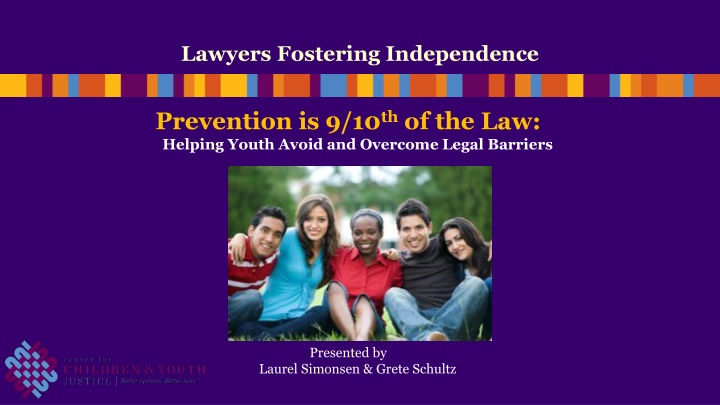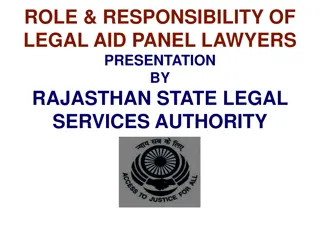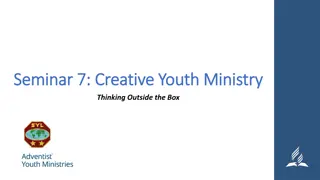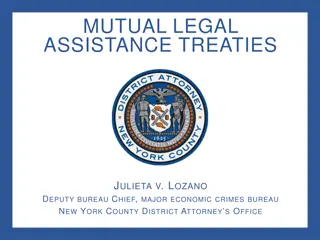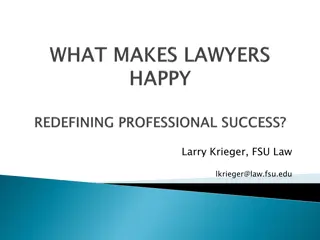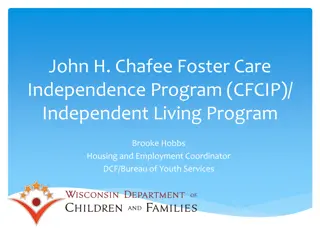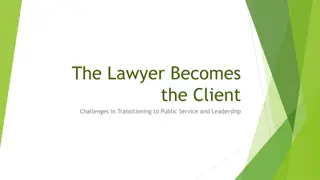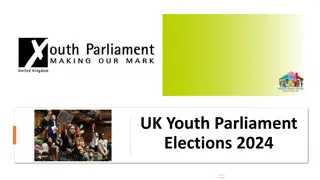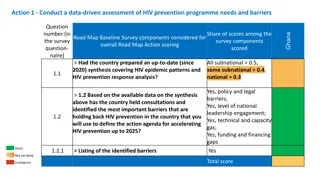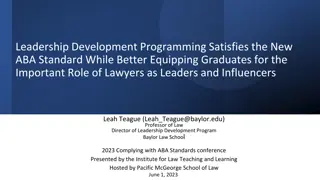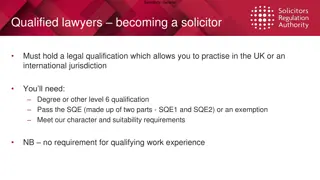Legal Assistance and Prevention to Empower Youth - Lawyers Fostering Independence
Providing civil legal aid and services to youth and young adults at risk of homelessness or with out-of-home care experience. Programs include pro bono representation, legal clinics, and know-your-rights presentations to prevent and overcome legal barriers. The 2018 Passport to College Conference focuses on identifying potential legal issues and offering guidance for early intervention. Case studies on housing disputes and credit/debt issues illustrate the importance of seeking legal assistance to address problems effectively.
Download Presentation

Please find below an Image/Link to download the presentation.
The content on the website is provided AS IS for your information and personal use only. It may not be sold, licensed, or shared on other websites without obtaining consent from the author.If you encounter any issues during the download, it is possible that the publisher has removed the file from their server.
You are allowed to download the files provided on this website for personal or commercial use, subject to the condition that they are used lawfully. All files are the property of their respective owners.
The content on the website is provided AS IS for your information and personal use only. It may not be sold, licensed, or shared on other websites without obtaining consent from the author.
E N D
Presentation Transcript
Lawyers Fostering Independence Prevention is 9/10th of the Law: Helping Youth Avoid and Overcome Legal Barriers Presented by Laurel Simonsen & Grete Schultz
Lawyers Fostering Independence Who We Serve: LFI provides civil legal assistance to youth and young adults (17y-25y) who either have lived experience in out of home care and/or have experienced, or are at risk of experiencing, homelessness. We currently have active programs in King and Snohomish Counties, with Pierce Co. coming online this spring. What We Do: Pro Bono Representation Drop-In Legal Clinics Know-Your-Rights Presentations Provider Trainings
2018 Passport to College Conference Today s Goal: to help professionals working with at-risk and systems involved youth identify potential legal issues, even before they occur, and to provide guidance on when to seek legal assistance. Topics: #1 Housing Disputes #2 Credit & Debt Issues #3 Interacting with Law Enforcement
2018 Passport to College Conference Topics #1 and #2 - Issue Spotting Can you identify at least three points where Maria could have benefitted from earlier assistance and/or intervention by a service provider and/or attorney? What preventative measures (or mitigating steps) could be taken at each of these points? At which point(s) should Maria and/or her case manager contact an attorney?
#1 Housing Disputes Scenario: Maria had been living in an apartment with a roommate for the past year. When they moved in, they noticed that there were a couple tiles missing in the bathroom and a stain on the living room carpet, but it wasn t very noticeable, so it didn t bother either of them. They both signed a 12- month lease, but ended up staying an extra couple of months after their lease ended. After that, they both decided to move to different apartments, so Maria called their landlord and told him they wanted to move out at the end of the month. Two weeks after she moved out, Maria received a letter and bill from the landlord stating that she owed $2,450, including an additional month s rent, replacement of the missing bathroom tiles, full carpet replacement, and replacing the closet door in her roommate s bedroom, which apparently had been broken when her roommate moved out.
#2 Credit & Debt Issues Scenario: Maria had to breach (not honor) the terms of her apartment lease she moved out without paying a month s rent. The landlord sent Maria a bill for the rent and some other fees associated with her moving out. Maria couldn t pay, so she ignored the bill. Months later, a debt collector that bought Maria s housing debt from the landlord started sending Maria nasty letters and leaving mean phone calls about the debt.
2018 Passport to College Conference Topic #3 Questions to Consider Is Maria in trouble? What proactive steps can Maria take after this incident? What resources are available to Maria to help?
#3 Interacting with Law Enforcement Scenario: Maria, who is 19 years old, was stopped by the police while she was walking down the street, minding her own business. Maria was walking home from a friend s house where she had had a little bit of beer earlier, but she was not visibly intoxicated. The police officer asked Maria for her name and ID, which she gave. He then asked Maria if he could search her backpack. Not wanting to appear confrontational, Maria said yes. The officer found a can of beer in her bag, along with some books and her wallet. The officer told Maria she would be getting something in the mail about the incident.
Summary Most legal problems can be prevented and/or mitigated before they become truly legal in nature. Empowering youth to know their legal rights and legal responsibilities is the key to prevention. Case managers and service providers can help young people prevent legal issues from escalating by knowing when and how to connect the youth with legal help.
Contact Us Grete Schultz LFI Staff Attorney Snohomish/Pierce Counties GSchultz@ccyj.org 206.696.7503 ext. 17 Laurel Simonsen LFI Managing Attorney King County LSimonsen@ccyj.org 206.696.7503 ext. 24
